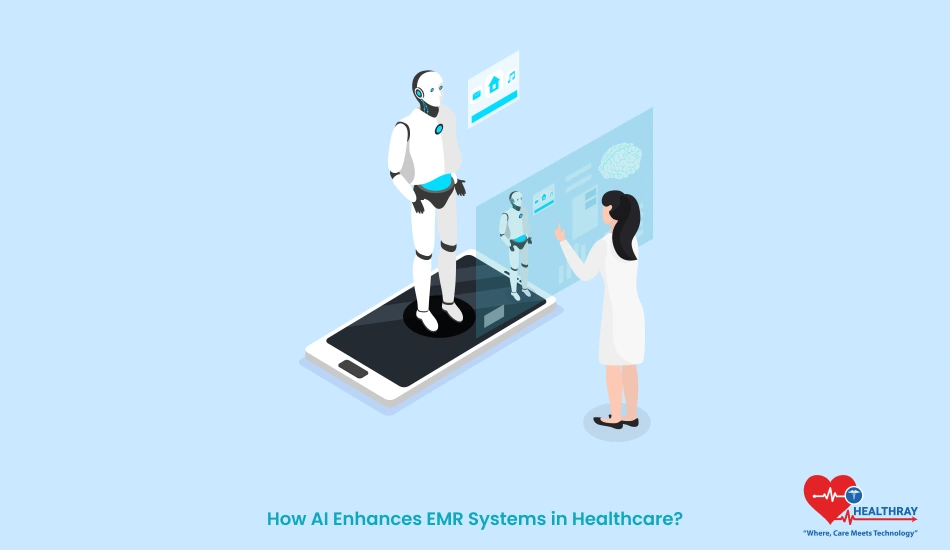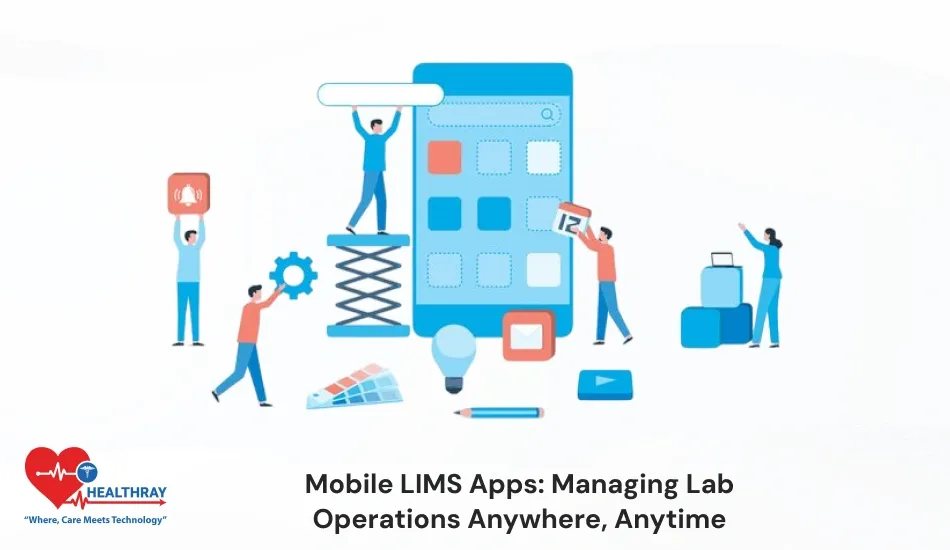The integration of Artificial Intelligence (AI) into Electronic Medical Records (EMR) systems is transforming how healthcare operates. The question isn’t whether AI can help improve EMRs; it’s how much of an impact it can make. By automating repetitive tasks, offering advanced decision support, and streamlining workflows, AI is revolutionizing the way healthcare professionals, hospital administrators, and doctors approach patient care.
This article will explore the role of AI in enhancing EMR systems, the real-world benefits it offers, and how it addresses common challenges in healthcare. If you’re looking to understand how AI can make EMRs more efficient while keeping patient care at the forefront, this guide has you covered.
Understanding AI in EMR Systems
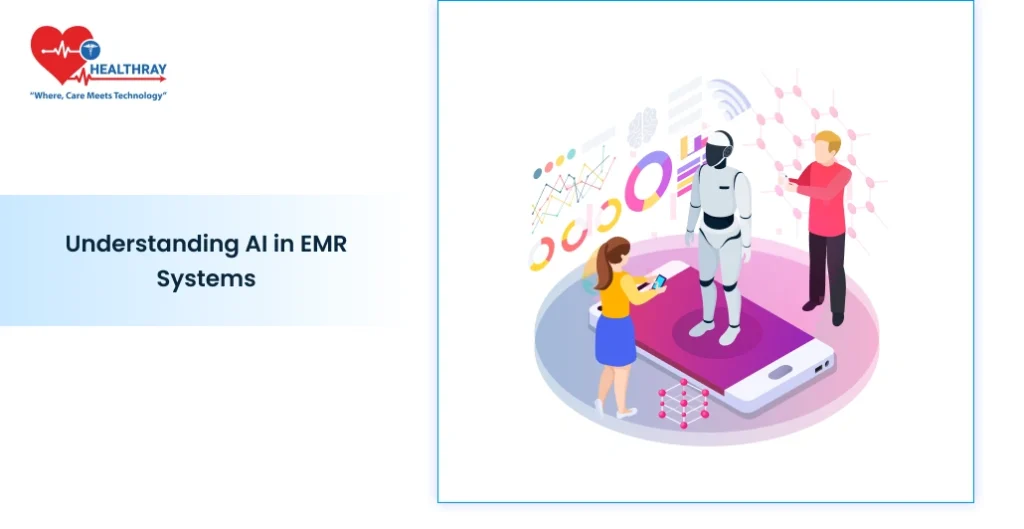
Artificial Intelligence has become a key driver of innovation in healthcare, especially in enhancing Electronic Medical Records (EMR) systems. By leveraging machine learning, natural language processing (NLP), and predictive analytics, AI transforms raw data into actionable insights.
Key AI Technologies in EMR Systems
- Natural Language Processing (NLP): AI can interpret and analyze unstructured data like doctors’ notes, lab reports, and patient histories, converting them into structured data within EMRs.
- Predictive Analytics: AI algorithms can predict patient outcomes, flag potential risks, and suggest preventive care measures, improving the overall quality of care.
- Machine Learning Models: These systems learn from historical data to provide personalized treatment recommendations or alert providers about anomalies in patient records.
Why AI is a Game-Changer for EMRs
Traditional EMR systems often struggle with usability, data overload, and inefficiencies. AI solves these issues by introducing automation and intelligence. For example, it can simplify complex interfaces, automatically populate patient records, and provide clinical decision support in real time.
AI doesn’t just make EMRs smarter. It also allows healthcare providers to focus on what matters most—patient care. With AI handling tedious documentation and data management, doctors and administrators can spend more time with patients and on critical decision-making.
Benefits of AI-Enhanced EMR Systems
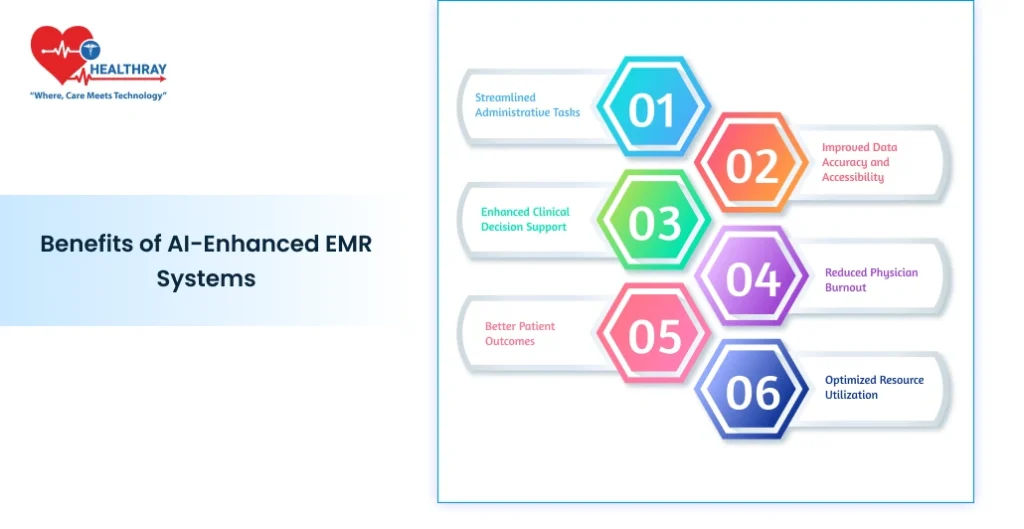
AI has brought a host of benefits to Electronic Medical Record Systems, addressing pain points that healthcare professionals, hospital administrators, and doctors often face. From reducing administrative burdens to improving patient care, here’s how AI is reshaping EMRs.
Streamlined Administrative Tasks
AI can automate repetitive processes like data entry, billing, and appointment scheduling. By reducing manual workload, healthcare providers can dedicate more time to patient care. For example:
- Speech-to-text features automatically transcribe patient interactions into the EMR.
- Intelligent systems populate forms and reduce redundant documentation.
Improved Data Accuracy and Accessibility
AI enhances the accuracy of patient records by identifying and correcting errors. It ensures that information is complete, consistent, and easily retrievable. Key outcomes include:
- Fewer errors in medication records and treatment plans.
- Enhanced accessibility through intuitive search features powered by natural language processing.
Enhanced Clinical Decision Support
AI-powered decision support tools analyze patient data to provide actionable insights. They can:
- Flag potential drug interactions.
- Recommend personalized treatment plans based on historical data.
- Predict patient deterioration using early warning systems.
Reduced Physician Burnout
By automating time-consuming tasks and simplifying workflows, AI reduces stress and burnout among healthcare professionals. Features like voice assistants and predictive charting allow doctors to spend more time with patients rather than screens.
Better Patient Outcomes
AI’s predictive capabilities improve diagnosis and treatment accuracy. For example:
- Early identification of at-risk patients can prevent complications.
- Machine learning models can suggest preventive care measures, reducing hospital readmissions.
Optimized Resource Utilization
AI helps administrators manage resources efficiently. It predicts patient inflow, optimizes staff scheduling, and ensures that medical supplies are used effectively.
AI isn’t just making EMRs more efficient; it’s driving meaningful changes in how healthcare is delivered. By addressing long-standing challenges, it empowers professionals to provide better care with less administrative hassle.
Real-World Applications and Case Studies
AI’s integration into EMR systems is no longer theoretical. Many healthcare organizations have successfully implemented AI-enhanced EMR systems, showcasing the transformative potential of these technologies. Here are some real-world applications and case studies that highlight their impact.
Predicting Patient Deterioration
A leading hospital in the U.S. implemented AI algorithms to analyze EMR data and predict patient deterioration in real time. By flagging high-risk cases early, healthcare providers were able to intervene promptly, reducing intensive care admissions by 20%.
Automated Clinical Documentation
A mid-sized hospital adopted AI-powered speech recognition for clinical documentation. Physicians used voice commands to update patient records, cutting documentation time by nearly 50%. This allowed doctors to focus more on patient interaction.
Reducing Diagnostic Errors
An AI-enhanced EMR system in a pediatric care center used machine learning to analyze symptoms and suggest potential diagnoses. This reduced diagnostic errors by 30%, significantly improving patient outcomes.
Streamlining Administrative Workflows
A large healthcare network implemented AI-driven automation to handle billing and insurance claims. The system identified discrepancies in real time, reducing claim denials by 15% and speeding up the reimbursement process.
Improving Resource Allocation
A hospital system used AI-powered predictive analytics to forecast patient inflow and adjust staffing schedules accordingly. This resulted in improved staff utilization and better patient wait times in emergency departments.
Early Disease Detection
An AI tool integrated with EMR systems in a primary care facility analyzed patient histories to identify those at high risk for diabetes. Early intervention programs reduced the onset of the disease by 10% among flagged patients.
These examples demonstrate how AI-powered EMRs are not only enhancing operational efficiency but also driving better patient outcomes. By leveraging AI, healthcare organizations are reaping measurable benefits while setting new standards for care delivery.
Implementation Strategies for AI in EMR Systems
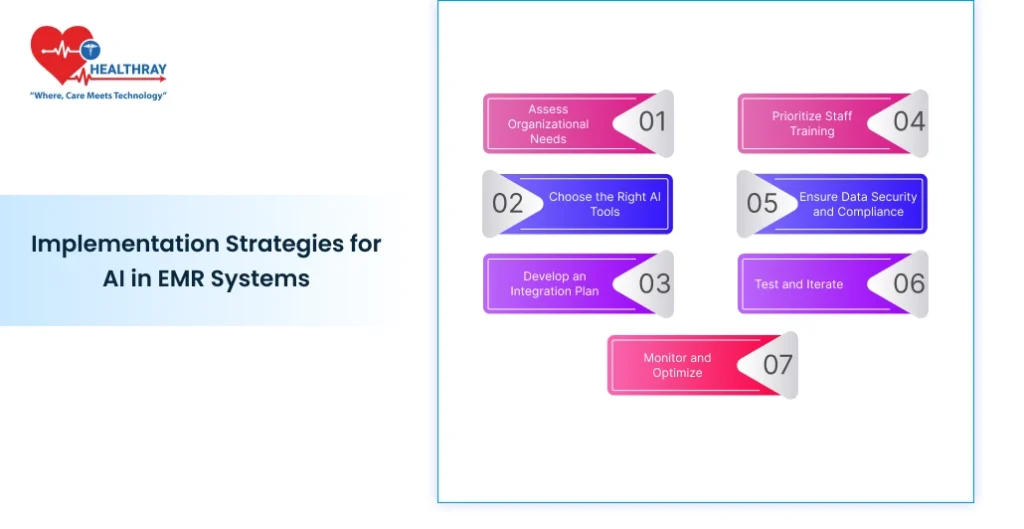
Introducing AI into EMR systems can seem daunting, but with a structured approach, healthcare organizations can navigate the process smoothly. Here’s a step-by-step guide to implementing AI in EMR systems.
Assess Organizational Needs
Before adopting AI, evaluate the specific pain points and goals of your organization. Common areas to assess include:
- High volumes of repetitive tasks.
- Data accuracy issues.
- Challenges in clinical decision-making.
- Resource allocation inefficiencies.
Identifying these needs will help prioritize AI features that align with your objectives.
Choose the Right AI Tools
Not all AI solutions are created equal. Select tools that integrate seamlessly with your existing EMR systems and address your primary challenges. Key considerations include:
- Compatibility with current software.
- Scalability to meet growing data needs.
- User-friendly interfaces for healthcare staff.
Develop an Integration Plan
Successful implementation requires a detailed roadmap. Coordinate with stakeholders, including IT teams, healthcare staff, and administrators, to ensure:
- Minimal disruption to daily operations during integration.
- Proper data migration strategies to avoid loss or errors.
- Customization of AI features to match workflow needs.
Prioritize Staff Training
Introducing AI requires healthcare staff to adapt to new workflows. Offer training programs that focus on:
- Understanding AI-driven features in the EMR system.
- Using tools like predictive analytics or voice recognition.
- Addressing concerns about the technology’s impact on workflows.
Proper training ensures smooth adoption and maximizes AI’s benefits.
Ensure Data Security and Compliance
AI systems in healthcare must adhere to strict data privacy and security regulations, such as HIPAA. To ensure compliance:
- Use encrypted systems to protect sensitive patient information.
- Regularly audit AI tools for vulnerabilities.
- Provide clear protocols for managing data breaches, if they occur.
Test and Iterate
Roll out AI enhancements in stages to test functionality and gather feedback from users. This allows for adjustments before a full-scale launch. Key testing areas include:
- Accuracy of AI predictions and outputs.
- Usability of new workflows.
- Impact on patient outcomes and staff efficiency.
Monitor and Optimize
Once AI tools are fully implemented, ongoing monitoring is essential. Evaluate performance metrics such as:
- Time saved in administrative tasks.
- Improvements in clinical decision-making.
- Feedback from staff on usability.
Use these insights to fine-tune the system for continuous improvement.
Implementing AI in EMR systems is a journey that requires careful planning and collaboration. When done right, it can lead to significant improvements in efficiency, accuracy, and patient care.
Challenges and Considerations in AI-Enhanced EMR Systems
While the benefits of AI in EMR systems are significant, there are challenges and considerations that healthcare organizations must address to ensure successful adoption. Understanding these obstacles helps in planning effective solutions.
Data Privacy and Security Concerns
AI systems handle sensitive patient information, making data security a top priority. Challenges include:
- Ensuring compliance with regulations like HIPAA.
- Protecting data from cyberattacks and breaches.
- Managing patient consent for data usage in AI-driven tools.
Solution: Implement robust encryption, access controls, and regular audits. Work with AI vendors that prioritize compliance with healthcare data standards.
Integration Complexities
Integrating AI tools with existing EMR systems can be complicated, especially in legacy systems. Compatibility issues may arise, leading to:
- Disruptions in workflow.
- Data migration challenges.
- Extended implementation timelines.
Solution: Collaborate with experienced IT teams and choose AI tools designed for seamless integration with popular EMR platforms.
Resistance to Change
Healthcare professionals may resist adopting AI due to concerns about:
- Increased workload during the transition phase.
- Fear of technology replacing human roles.
- Uncertainty about the reliability of AI-driven insights.
Solution: Provide clear communication about AI’s role as a support tool rather than a replacement. Offer hands-on training to build trust and confidence in the system.
Initial Costs and ROI Uncertainty
AI-enhanced EMR systems often involve significant upfront costs for software, training, and infrastructure upgrades. Many organizations worry about the time required to achieve a return on investment (ROI).
Solution: Conduct a cost-benefit analysis to highlight potential savings in administrative costs and improved patient outcomes. Look for scalable solutions to spread costs over time.
Data Quality Issues
AI systems rely on clean, high-quality data to function effectively. Inconsistent or incomplete records can lead to inaccurate predictions and insights.
Solution: Implement data validation processes and clean up existing datasets before integrating AI tools. Encourage accurate and thorough documentation by healthcare staff.
Ethical Considerations
Using AI in EMRs raises ethical questions, such as:
- Bias in AI algorithms leading to inequitable care.
- Lack of transparency in how AI reaches decisions.
- Balancing automation with the human element of patient care.
Solution: Choose AI tools with transparent algorithms and regularly assess their performance to identify and mitigate bias. Ensure that decisions remain under human supervision.
Ongoing Maintenance and Upgrades
AI systems require regular updates and maintenance to stay functional and relevant. Neglecting this can result in reduced efficiency over time.
Solution: Establish a long-term maintenance plan with your AI vendor, including periodic updates and technical support.
Addressing these challenges proactively ensures that AI integration not only enhances EMRs but also fosters trust among users and delivers lasting benefits to healthcare organizations.
Future Trends in AI and EMR Systems
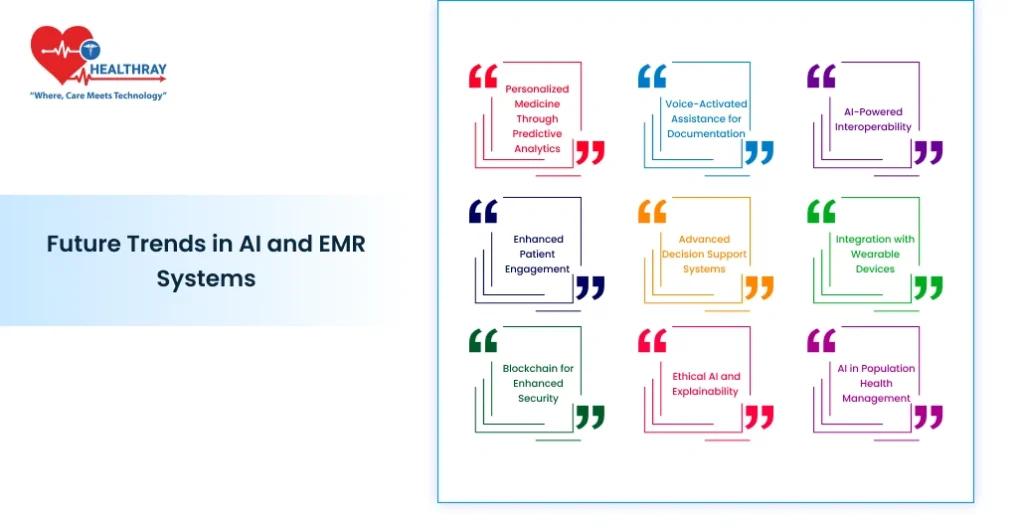
The integration of Artificial Intelligence in Electronic Medical Records is just the beginning. As technology evolves, AI is poised to bring even more transformative changes to healthcare. Here are some emerging trends to watch in the coming years.
Personalized Medicine Through Predictive Analytics
AI will increasingly enable EMR software to deliver tailored treatment plans based on a patient’s genetic, environmental, and lifestyle data. This trend promises:
- Improved outcomes for chronic disease management.
- Early detection of hereditary conditions through genomic analysis.
- Precision in medication dosing based on individual health profiles.
Voice-Activated Assistance for Documentation
Voice recognition is expected to evolve further, allowing healthcare professionals to interact with EMR systems conversationally. Future applications may include:
- AI virtual assistants summarizing patient histories in real time.
- Multilingual support for diverse patient populations.
- Greater accuracy in capturing clinical notes without manual entry.
AI-Powered Interoperability
The next generation of AI tools will focus on breaking down data silos by making EMR systems more interoperable. This includes:
- Seamless data sharing across different healthcare systems.
- Unified patient records accessible to multiple providers.
- Reduced redundancy in diagnostic tests.
Enhanced Patient Engagement
Future AI-enabled EMRs will play a more active role in engaging patients. Anticipated developments include:
- Predictive tools that send reminders for checkups or medication refills.
- AI-driven chatbots that answer patient queries about their care plans.
- Mobile apps that sync with EMRs to provide real-time health insights.
Advanced Decision Support Systems
AI’s ability to process large datasets will lead to more sophisticated clinical decision support. These systems will provide:
- Real-time recommendations during patient visits.
- Risk stratification for large patient populations.
- Integration of real-world evidence into decision-making.
Integration with Wearable Devices
AI-enhanced EMRs will incorporate data from wearable devices, giving providers a more comprehensive view of patient health. Key benefits include:
- Continuous monitoring of vital signs and activity levels.
- Alerts for abnormal readings or potential emergencies.
- Insights into patient adherence to prescribed therapies.
Blockchain for Enhanced Security
Future AI systems may leverage blockchain technology to enhance EMR data security and transparency. Benefits include:
- Immutable patient records to prevent tampering.
- Decentralized access control for improved privacy.
- Secure audit trails for regulatory compliance.
Ethical AI and Explainability
There will be an increased focus on building AI systems that are transparent, explainable, and free from bias. This ensures:EMR System
- Greater trust among healthcare professionals and patients.
- Compliance with evolving regulatory standards.
- Ethical application of AI in clinical care.
AI in Population Health Management
AI-powered EMRs will play a crucial role in managing population health by:
- Analyzing trends across patient populations.
- Identifying and addressing health disparities.
- Supporting public health initiatives through actionable insights.
The future of AI in EMR systems is about creating smarter, more efficient, and patient-centered solutions. These trends promise not only to enhance healthcare delivery but also to redefine the relationship between technology and human expertise.
Conclusion
The integration of Artificial Intelligence into EMR systems is a turning point for the healthcare industry. By automating repetitive tasks, enhancing decision-making, and improving data management, AI enables healthcare professionals, hospital administrators, and doctors to focus more on patient care.
While the benefits are transformative, successful implementation requires careful planning. Addressing challenges like data security, integration complexities, and staff training is essential for realizing the full potential of AI in the Hospital Management System. As technology continues to evolve, the future promises even more advanced solutions, from personalized medicine to real-time clinical decision support.
For healthcare organizations, embracing AI is not just about staying ahead of the curve. It’s about delivering better care, improving efficiency, and shaping a healthier tomorrow.
